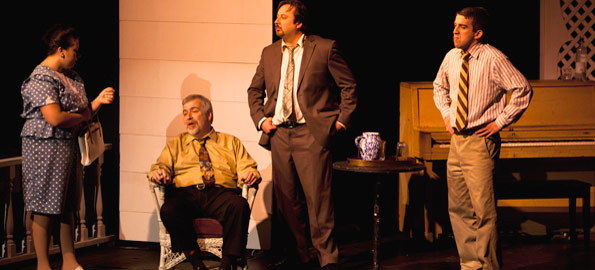Campus production celebrates Tennessee Williams 100th birthday with “Sweet Bird of Youth”
The Guardsman

Weakness and fleeting youth are at the heart of one of Tennessee Williams’ last great plays, “Sweet Bird of Youth,” performed during a three-week run through Nov. 20 at the Diego Rivera Theatre.
Performed under the direction of theater arts department chair and instructor, Gloria Weinstock, the characters in the play include a faded Hollywood star named Alexandra del Lago and an aging gigolo named Chance Wayne.
Chance returns to his hometown hoping to reunite with his high school sweetheart, Heavenly, but instead embarks on a hellish journey to prove his worthiness.
As the characters deteriorate before the audience, complex themes unravel with the poignancy of classic southern relationships that Williams is renowned for crafting.
Yet the 14 actors lack emotion and the audience is forced to compensate.
Captivating moments in the play revolve around Boss Finley, played by Robert Cooper, whose brash and dominant presence pairs well with Boss Finley’s abrasive characteristics. He orders his son to protect Heavenly, his daughter, from the return of Chance Wayne, through whatever means are necessary, including violence and intimidation.
“Don’t talk to me about it, just go about it!” Boss Finley says, exposing the dark heart he loves and hates with. Cooper’s portrayal of Boss Finley includes a rich mix of mirth, vengeance and outrageous southern indignation about race relations.
The costuming in the production is a success. Alexandra, played by Helen Artelis stumbled throughout her hotel bedroom in a pair of red heeled slippers and gowned herself like a princess in all scenes, while Heavenly, played by Erika Quintana, seduced the audience in a revealing yet old-fashioned one-piece bathing suit, and a delicate doll dress of virginal white.
“Sweet Bird of Youth” is significant as of one of Williams’ last well-renowned plays and under the direction of Weinstock, its greatest flaws are exacerbated.
Chance’s homecoming is financed by the drunken and aging actress Alexandra del Lago. He seeks Heavenly’s hand, but for petty reasons; he envies a time when he was a celebrated member of the community, loved by the prettiest girl around.
He embodies a form of human corruption that Williams sought to expose.
Alexandra is the picture of an aging, beautiful woman who does not desire to age and instead douses her days with drinking and drugs.
“I want to forget everything. I want to forget who I am,” she says.
Drew Davis-Wheeler struggles to expose the sexual and adolescent side of Chance. In the opening scene, he childishly blackmails Alexandra for his own gain. Chance thrives on getting by with the least possible effort, and yet Davis-Wheeler attempts to turn him into a determined and proud man.
When a character named Scudder, played by Anthony Scoggins, enters a scene to inform Chance that his mother is dead and that Chance shouldn’t pursue Heavenly, Chance’s reaction is muted. Without having listened closely, one would not realize that Chance’s aspirations had been dashed due to the actor’s lack of reaction and expression.
The play is as unorganized as the staging, with awkward blocking and poor make-up. At one point the telephone rings with the sound resonating from the side of the stage opposite of the phone. In one bar scene, Chance walks close to the edge of the stage to tiptoe around a table that was placed obstructively nearby.
The direction fails to develop the charm that Williams is celebrated for.
Underneath the productions flaws however, Williams’ grandest moments are still conveyed.

Comments are closed.